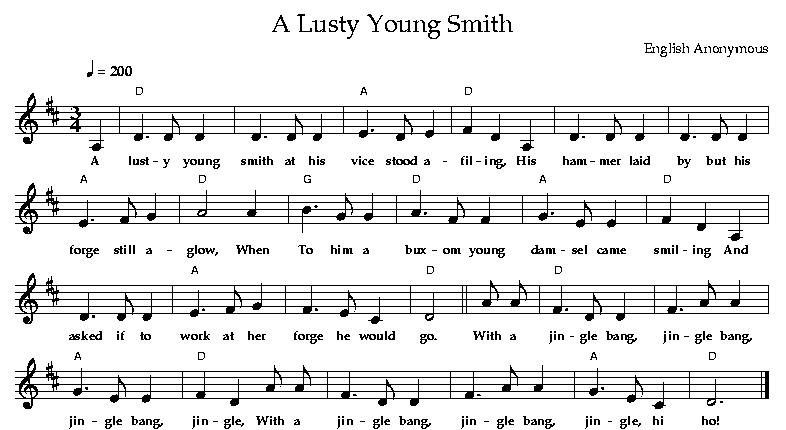
- A lusty young smith at his vise stood a-filing,
His hammer laid by but his forge still aglow,
When to him a buxom young damsel came smiling
And asked if to work at her forge he would go.
With a jingle bang, jingle bang, jingle bang, jingle,
With a jingle bang, jingle bang, jingle, hi ho!
- “I will,” said the smith, and they went off together,
Along to the young damsel's forge they did go.
They stripped to go to it, 'twas hot work and hot weather;
She kindled a fire and she soon made him glow.
With a jingle bang, etc.
- Her husband, she said, no good work could afford her;
His strength and his tools were worn out long ago.
The smith said, “Well mine are in very good order,
And now I am ready my skill for to show.”
With a jingle bang, etc.
- Red hot grew his iron, as both did desire,
And he was too wise not to strike while 'twas so.
Quoth she, “What I get, I get out of the fire,
Then prithee, strike hard and redouble the blow.”
With a jingle bang, etc.
- Six times did his iron by vigorous heating,
Frow soft in her forge in a minute or so,
And as often was hardened, still beating and beating,
But each time it softened, it hardened more slow.
With a jingle bang, etc.
- The smith then would go; quoth the dame, full of sorrow,
“Oh, what would I give could my husband do so!
Good lad, with your hammer come hither tomorrow,
But, pray, can't you use it once more ere you go?”
With a jingle bang, etc.
While it is often claimed that this song is Elizabethan in age,
the oldest version I know of it is in the early 18th century
Wit and Mirth, or Pills to Purge Melancholy of Thomas d'Urfey,
where it has a different chorus and tune.
The song was revived and popularized by Ed McCurdy on his
When Dalliance Was in Flower and Maidens Lost Their Heads
recording from 1956.
This recording was the first in McCurdy's four-volume series of early
bawdy songs.
